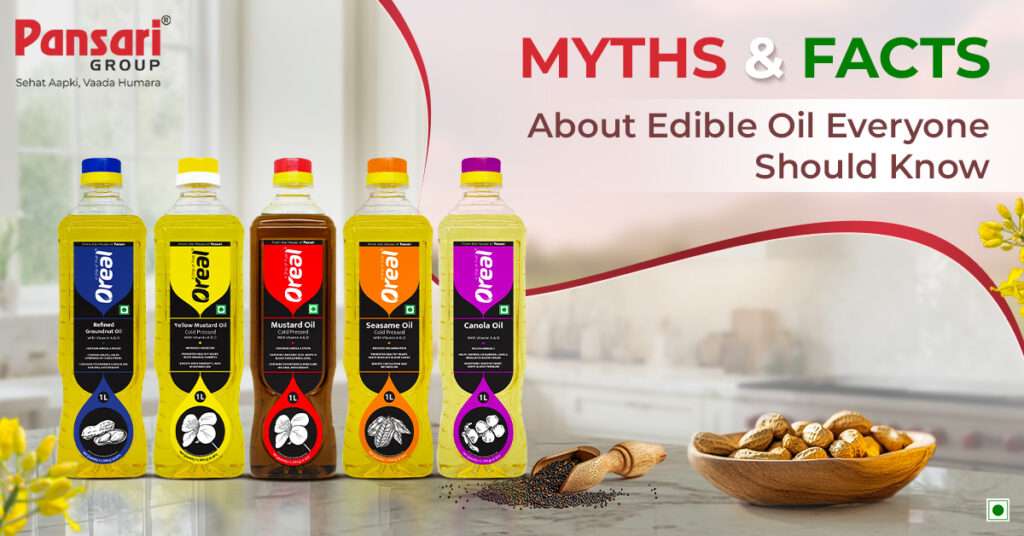Within every Indian household, edible oil plays an important role. It is used for frying, sautéing, baking, and even in salads at times. However, its uses are not limited to cooking alone – it also finds a place in personal care, body care, and even oil purifiers.
What makes the edible oil industry confusing is the mix of myths, fabricated stories, and little-known facts. It can be hard to know which oils are healthy, which can be harmful, and which should be consumed in moderation. This lack of clarity often worries families. This blog is designed to clear the confusion and guide families with the trusted expertise of Pansari.
Myth 1: All Edible Oils Are the Same
One common misconception is that all edible oils are alike. People often believe they can substitute one oil with another without any difference in nutrition or taste. This is far from the truth.
Fact:
Different edible oils have different compositions, smoke points, and nutritional values. For instance, sunflower oil is known for being light and easy to digest, while mustard oil is rich in omega-3 fatty acids. Pansari offers a wide range of edible oil options such as Pansari Mustard Oil and Pansari Sunflower Oil, each catering to specific cooking needs and health benefits.
Myth 2: Cooking Using Edible Oils Always Makes The Food Unhealthy
It’s a common misconception that using oil in cooking renders the whole dish unhealthy. People have the misconception that oils contain fats which cause obesity and other related problems.
Fact:
All kinds of oil does not have a negative effect on health. The body needs healthy fats for energy, absorption of nutrients as well as cell development. The secret is using the right edible oil and moderation in consumption. An example of healthier selections is Pansari’s Soyabean Oil which contain essential fatty acids and antioxidants for the heart.
Myth 3: Only Olive Oil is Healthy
Another myth is that olive oil is the only oil that possesses health benefits. This myth has spread because of mass marketing and health crazes.
Fact:
It is true that olive oil has benefits, other types of edible oils are equally nutritious, and in some cases, better for Indian cooking. Pansari Mustard Oil are great for frying and deep cooking because of its high smoke points and unique flavor profiles. These oils are also equally heart-friendly and nutrient-rich.
Myth 4: It is Safe to Reuse Edible Oil
Many households tend to accept cooked oil after deep frying food to save money and expenses, and it is a common practice but not without risks.
Fact:
Edible oil is dangerous to health because reusing it increases the risk of heart diseases and digestive problems. It is always better to invest in high-quality oils and reusing oil multiple times should be avoided. Pansari Sunflower Oil is a great example since it is affordable and safe.
Myth 5: Edible Oil Without Cholesterol Means It is Free From Fats
Some people will claim that an oil is free of cholesterol which might make people think that oil has no fats at all and is therefore safe to consume in any quantity.
Fact:
All plant-based oils for human consumption contain no cholesterol, however, they still contain fats even in small quantities. Oils are predominantly fats, and some are far better for you than others. Pansari Soyabean Oil, for example, has no cholesterol, and still offers the body with essential polyunsaturated fats.
Myth 6: Mustard Oil is Not Suitable for Cooking
There has been a long-standing myth that mustard oil should not be used for cooking due to its pungent aroma and supposed health risks.
Fact:
Mustard oil has been used in Indian kitchens for centuries and is one of the healthiest oils available. Rich in monounsaturated fatty acids and omega-3s, it supports heart health and improves digestion. Pansari Mustard Oil is a perfect example of a traditional edible oil that continues to provide both taste and health benefits.
Myth 7: The More Edible Oil, The Better the Taste
Some individuals are of the opinion that adding oil while cooking improves the flavor and makes the food richer.
Fact:
The excessive use of oil contributes to unnecessary calories and may also overpower and take away the real flavor of the food. Oil, when used in moderation always tastes better and makes the food healthier. With Pansari tilsari Oil and other top-grade oils, you can prepare meals that taste amazing without excessive oil use.
READ ALSO: The Role of Edible Oils in a Balanced Diet: What You Need to Know
Conclusion
Our diet generally includes oil, unlike some essential nutrients, this is oil is misconceived due to the various misleading information available. This can be remedied to some extent by oil selection, quantity, or the health considerations.
Edible oils fortified with nutrients and crafted to fit the different cooking styles and nutritional needs include Pansari Mustard oil, Pansari Soyabean oil, Pansari Rice Bran oil, and Pansari Sunflower oil. Due to these misconceptions, proper solutions have not been constructed to help in the abundance of health and taste.
FAQ’s
1. What is the healthiest edible oil for cooking in India?
All mustards, rice bran, and sunflower oils work very well for Indian cooking. The selection is dish-dependent and individual health appreciates the benefits each brings.
2. Can cooking oil be reused after frying?
No, the reuse of the oil is recommended in the case of health and the well-being of individuals, oil must be avoided and discarded altogether.
3. Is there a point in moderation when consuming cholesterol-free edible oil?
No. Despite being free of cholesterol, all oils still contain fats which must be controlled in consumption.
4. Is it okay to use mustard oil for cooking on a daily basis?
Yes. Daily use of mustard oil is acceptable, nutritious and supportive of digestion, and adds real Indian flavor to the dishes.

